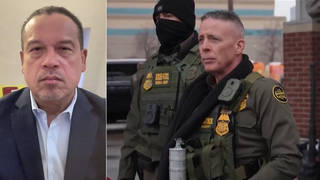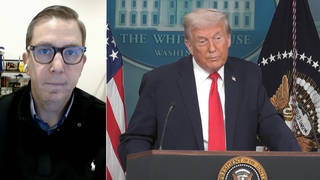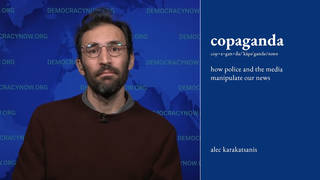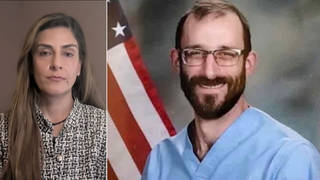
Guests
- John Mearsheimerprofessor of political science at the University of Chicago and international relations theorist known for his realist perspective.
- Matt Dussexecutive vice president at the Center for International Policy and former foreign policy adviser to Senator Bernie Sanders.
As U.S. President Donald Trump and Russian President Vladimir Putin meet in Alaska for a high-stakes summit to discuss a possible ceasefire in Ukraine, we host a debate between two foreign policy thinkers about the war, its causes and how it could be brought to a conclusion.
John Mearsheimer is an international relations theorist at the University of Chicago, known for his realist perspective. He has long argued that Western policies are the main cause of the Ukraine crisis. “There’s overwhelming evidence that it was NATO expansion into Ukraine that drove this train,” says Mearsheimer.
Matt Duss is executive vice president at the Center for International Policy and the former foreign policy adviser to Senator Bernie Sanders. He says that despite Western missteps, Russia is ultimately the main cause of the current war, which Putin started in 2022 with a full-scale invasion of Ukraine. “Putin has made clear that he has a pretty grandiose historical conception of what he sees as a kind of renewed Russian empire,” he says.
Both Mearsheimer and Duss say Ukraine’s war effort is flagging and that the best way out is to “make the best peace they can,” even if it means conceding territory to Russia.
Transcript
AMY GOODMAN: This is Democracy Now!, democracynow.org, The War and Peace Report. I’m Amy Goodman in New York. Juan González is in Chicago.
President Trump and Russian President Vladimir Putin are meeting today in Alaska for a high-stakes summit to discuss a possible ceasefire in Ukraine. At the White House, Trump predicted Friday’s summit could lead to a follow-up meeting that would include Ukrainian President Volodymyr Zelensky.
PRESIDENT DONALD TRUMP: It’s going to be a good meeting, but the more important meeting will be the second meeting that we’re having. We’re going to have a meeting with President Putin, President Zelensky, myself, and maybe we’ll bring some of the European leaders along, maybe not. It’s — I don’t know that. It’s going to be very important. We’re going to see what happens. And I think President Putin will make peace. I think President Zelensky will make peace. We’ll see if they can get along. And if they can, it’ll be great.
AMY GOODMAN: On Wednesday, Trump warned Russia would face very severe consequences if Putin doesn’t agree to a ceasefire deal. Meanwhile, Zelensky has rejected proposals for Ukraine to give up territory in the Donbas region as part of a ceasefire.
Today’s summit is taking place in Alaska, which the United States purchased from Russia in 1867. The meeting marks Putin’s first visit to the United States since 2015, when he met with President Obama during the United Nations General Assembly. Trump and Putin last met in 2019 at the G20 in Japan.
Today’s summit is taking place even though there’s an outstanding warrant from the International Criminal Court seeking Putin’s arrest for war crimes involving the unlawful transfer of children from occupied areas of Ukraine. Neither Russia nor the U.S. is a party to the Rome Statute that established the ICC.
This all comes as Russian forces claim to have captured two more settlements in Ukraine’s eastern Donbas region, while Ukraine ordered the mandatory evacuation of families from a town close to where Russian forces recently broke through frontlines.
To talk more about the war in Ukraine, U.S.-Russian relations and more, we’re joined by two guests. In Washington, D.C., Matt Duss is with us, executive vice president at the Center for International Policy, former foreign policy adviser to Senator Bernie Sanders. And John Mearsheimer joins us from Cambridge, Massachusetts. Mearsheimer is professor of political science at the University of Chicago and author, most recently, of How States Think: The Rationality of Foreign Policy. In 2014, he wrote a widely read piece for Foreign Affairs headlined “Why the Ukraine Crisis Is the West’s Fault.”
Well, Professor Mearsheimer, let’s begin with you. Talk about what’s happening today in Alaska and what your view is of Trump’s relationship with Putin and Zelensky and what needs to happen now.
JOHN MEARSHEIMER: [inaudible] very much wants a peace agreement. He wants to shut down the Ukraine war. But the fact is that he’s not able to do that, and meeting in Alaska with Putin today is not going to do anything to help achieve that end.
And the principal problem here, Amy, is that the Russians have a series of demands that they will not compromise on, that Trump cannot accept, and certainly the Ukrainians won’t accept, and the Europeans won’t accept. And those three demands involve the West and Ukraine recognizing that Russia has annexed four Ukrainian oblasts and the Crimea. That’s number one. Number two is the Russians insist that Ukraine be a neutral state. This basically means it can’t be in NATO, and it can’t have security guarantees from the West, especially the United States. And then, the third demand is that Ukraine disarm to the point where it doesn’t have significant offensive capability against Russia. These demands are unalterable from a Russian perspective, but obviously they’re unacceptable to the Ukrainians, they’re unacceptable to the Europeans, and there’s no way that Trump can agree to them. So, there’ll be a lot of talking today about a lot of issues, but I find it hard to imagine you’re going to make any progress towards an agreement.
JUAN GONZÁLEZ: And, Professor Mearsheimer, the mere fact that this summit is between Trump and Putin, doesn’t that, in effect, reinforce the perspective of some that this has essentially been a proxy war between the United States and Russia from the beginning?
JOHN MEARSHEIMER: Oh, it’s clearly been a proxy war, and there’s no question that the United States and Russia are almost at war with each other, and therefore it makes sense for Putin and for Trump to sit down and talk and try to work out the broad parameters of a deal. But the problem is, there are two other players in the game, and those two other players are Ukraine and Europe. So you have a situation here, Juan, where even if Putin and Trump were to work out some sort of agreement, they could lay out the parameters of a deal, they have to run that deal by the Ukrainians and the Europeans. And I think if Trump makes the necessary concessions to accommodate the Russians, the problem is that there’s no way the Ukrainians, the Europeans and, truth be told, a large chunk of the American national security establishment would accept the deal that Putin worked out. And that’s why this one is ultimately going to be settled on the battlefield.
JUAN GONZÁLEZ: I’d like to bring in Matt Duss to the conversation. Matt, your perspective on this, this summit in Alaska, and what you expect or think may come out of it?
MATT DUSS: Yeah, thank you. I mean, in terms of what’s going to come out of this summit, I actually don’t disagree with Professor Mearsheimer. It seems like there’s not been a great deal of preparation going into this summit. And Putin — as the professor said, Putin’s goals do not seem to have changed much, if at all. He wants a Ukraine that’s effectively under his influence, part of Russia’s sphere of control. That’s not something the Ukrainians are going to agree with.
I think we can imagine a possible resolution to this in which Russia retains control of parts of Ukraine. I think there is some evidence that Ukrainians themselves would settle for that, if it really ended the war. And I think that’s the key question here. Can we get an agreement that ends the war, not just temporarily, but in the long term? And I think that’s very, very unlikely, at least right now, although I will say just the fact that the U.S. and Russia are sitting down could possibly create some other opportunities that we haven’t yet considered, although I’m very skeptical.
AMY GOODMAN: I want to put this question to both Matt Duss and Professor Mearsheimer, because I know that you disagree on this issue, is: How did we get to this point? Let’s start with you, Matt.
MATT DUSS: Well, we got to this point because Vladimir Putin decided to invade Ukraine and try to take it over. There’s a longer history there, of course. I mean, Professor Mearsheimer has talked a lot about the growth of NATO and how Russia sees that as a threat. I think there is evidence that that is true. I mean, that — others have claimed that, as well. U.S. officials throughout the 1990s, former Secretary of Defense Bill Perry, former head of the CIA Bill Burns, have all, in their time as diplomats, mentioned that this is a real problem for Russia, not just for Putin. However, that does not explain the entire problem. NATO alone was not the cause of this war.
Putin himself has made clear various times, most notably in a speech that he gave in June 2021, of his much grander vision of a kind of restored Russian imperium in which Ukraine was a part. So, I think the growth of NATO, you know, again, is part of Russia’s larger grievance, but I do think Putin has made clear that he has a pretty grandiose historical conception of what he sees as a kind of renewed Russian empire, that is simply not consistent, certainly, with Ukraine’s own sovereignty and independence, and I don’t think it’s consistent with a kind of a general approach to international affairs that is based in any kind of law or norms.
AMY GOODMAN: Professor Mearsheimer?
JOHN MEARSHEIMER: I think, Amy, before I give you my explanation on what caused the war, it’s very important to understand that how you think about the causes of the war has huge implications for how you think about the prospects for actually settling the conflict.
Now, Matt basically makes the argument that the principal cause of the war was that Putin had grand ambitions. He wanted to restore the Soviet Union, create a greater Russia, or what have you, and he was interested in conquering Ukraine and incorporating it into Russia. I don’t believe that. I believe there’s hardly any evidence to support that line of argument.
And I think it’s quite clear — in fact, I think there’s overwhelming evidence — that it was NATO expansion into Ukraine that drove this train. Putin made it clear, when NATO first announced, in April 2008, that Ukraine would become part of NATO. Putin made it perfectly clear that he viewed this as an existential threat, and this would not be allowed to happen. And the invasion on February 24th, 2022, was driven in large part by fear of NATO expansion.
And what that means is that Putin sees NATO expansion, he sees Ukraine in NATO, as an existential threat. And because he sees it as an existential threat, he’s unwilling to compromise. Many people think that in Alaska what Trump can do is work out a deal where there’s a territorial swap, where there’s a ceasefire to start with, and so forth and so on, and the Russians will make this accommodation and that accommodation. That’s not true. The Russians have laid out their demands from the very beginning. They have not wavered at all. And the reason they have not wavered is because they view Ukraine in NATO as an existential threat.
We, on the other hand, in the West, don’t see things that way. We think that Trump was — I mean, that Putin was just aggressive, he didn’t get all he wanted, but we can work out a deal with him. I don’t think that is an accurate description of reality. I think, again, you want to understand that Ukraine has to be a neutral state. There can be no Ukraine in NATO. There can be no Western security guarantees to Ukraine. But we refuse to accept that, the Ukrainians refuse to accept that, and that’s why we’re at an impasse today.
JUAN GONZÁLEZ: Matt Duss, I wanted to ask you — back in 2013 and 2014 on Democracy Now!, we had the Russia expert Stephen Cohen on many times, and he essentially said the same thing. In fact, he insisted that the president who was overthrown, Yanukovych, wanted to maintain the neutrality of — in the Maidan revolt in 2014, wanted to maintain the neutrality of Ukraine, but it was the — it was NATO that was insisting, no, that Ukraine could not be — could not be neutral, and it had to take a stand against Russia, and that’s part of what then led his overthrow, that the United States clearly backed. I’m wondering your sense of that. And also, do you think that if Mexico reached a security agreement with China or Russia, stationed troops from those countries in its own country, or missiles from those countries in Mexico, that the United States would sit idly by?
MATT DUSS: Sure. I mean, all good questions. I mean, first, I want to just respond to something Professor Mearsheimer said. I mean, it’s baffling to hear him claim that there’s no evidence that Putin wanted to conquer Ukraine and establish a new kind of Russian imperium. Putin has said this explicitly. I would encourage people to look at that June 2021 speech that I mentioned. He also, you know, landed troops outside Kyiv in February 2022 as part of the failed effort to topple Ukraine’s government and install his — you know, a friendly Russian government. Those Russian troops were not landed in Kyiv to go camping. So, that effort failed. But I think that’s clear evidence that Putin’s ambitions were much larger than the professor seems to claim.
Now, with regard to the Maidan and Yanukovych, I don’t think I would put this on NATO. Clearly, as I said, Russia and Putin have seen the growth of NATO as a threat. I think we should take that seriously. That’s something we need to discuss. I would also note that countries are not absorbed into NATO. Countries in Europe have sought to join NATO. This is not something that is being imposed on them. They see joining NATO as part of their security. Again, that’s not to diminish, I think, the kind of the way that Russia sees this as provocative. I do think we need to take that seriously. But the Maidan revolution was not about NATO. The Maidan revolution was about the people of Ukraine seeking closer relationships with Europe, rather than closer relationships with Russia. And I think it’s important to note that. This is not something that was driven by NATO. This was something that was driven by the Ukrainian people. And I think this constant obsession with NATO really denies Ukrainians their own agency. And I think we need to put that really at the center of this conversation.
Now, your question about Mexico, clearly, if Mexico was to sign a security agreement with Russia or China or any other power, the United States would probably have something to say about it. I think that’s something we should work through diplomatically. That would not, in my view, justify the United States invading and occupying parts of Mexico in response.
AMY GOODMAN: I want to talk about what Ukrainians want, first going to Zelensky, the Ukrainian president, speaking to reporters during a joint briefing in Berlin with the German Chancellor Friedrich Merz.
PRESIDENT VOLODYMYR ZELENSKY: [translated] We must prepare a trilateral format for the conversation. There must be a ceasefire, number one. There must be really reliable security guarantees. Today, by the way, President Trump spoke about supporting this and about America’s readiness to participate. Also among the agreed principles, Russia cannot have a veto right over Ukraine’s European and NATO prospects. And peace talks should be combined with appropriate pressure on Russia. Sanctions must be in place, and they must be strengthened if Russia does not agree to a ceasefire in Alaska.
AMY GOODMAN: Let me go to Professor Mearsheimer first and point out that there was just this Gallup poll. More than three years into the war, Ukrainian support for continuing to fight until victory has hit a new low. In Gallup’s most recent poll of Ukraine, conducted in early July, 69% say they favor a negotiated end to the war as soon as possible, compared with 24% who support continuing to fight until victory. Let’s go back to 2022. Three-quarters, 73%, in Ukraine favored Ukraine fighting until victory. Let’s get your response, Professor, and then Matt Duss.
JOHN MEARSHEIMER: Well, I think it’s not surprising that enthusiasm for the war in the Ukrainian body politic has diminished. They’ve suffered enormous casualties. The Russians have been winning on the battlefield, and it doesn’t look like Ukraine can rescue the situation or that the West can help Ukraine rescue the situation. So, obviously, down below, in Ukrainian society, support for the war is beginning to melt away.
The problem is that at the elite level, there’s no evidence that anyone is willing to cut a deal with the Russians. And again, you want to understand that the Russians are driving a hard bargain here. They’re driving a really hard bargain. It will be extremely difficult — and I’m choosing my words carefully here — for any Ukrainian leader to accept the terms that the Russians have on the table and don’t show any flexibility with regard to.
Now, what the Ukrainian elites are hoping they can do is they’re hoping that they can drag the Americans and they can drag the Europeans into giving meaningful security guarantees to Ukraine for the future, and that they will continue, the West will continue, to support Ukraine, and that at some point in the future, Russia will weaken, and Ukraine will be in a position, with help from the West, to get territory that it’s now lost back from Russia. That’s their great hope. So, the elites are willing to hang in there. And this is what you see reflected in Zelensky’s comments.
But the question you have to ask yourself, Amy, is: What is going to happen to Ukraine in this war as it continues to lose on the battlefield and support at home melts away? One would think at some point Ukraine will collapse. Given historical evidence, that is the likely outcome.
AMY GOODMAN: Matt Duss, do you agree?
MATT DUSS: Yeah, I do pretty much agree, except I would — I would not put so much on Ukraine’s elites. Clearly, there are some in the Ukrainian government, you know, who fit the characterization that the professor just made.
But I think what’s important here to note is that there is growing support among Ukrainians, as you noted, to end this war, if this was a — if you could have a durable and real end to the war. I don’t think we should — you know, with regard to President Zelensky’s comments, I don’t think anyone should be surprised. I don’t think anyone should expect the president of Ukraine to kind of preemptively concede territory. I do think that if there was an offer or an agreement in the works that really ended the war, the government of Ukraine could probably be pressured into agreeing to it. They understand there is political support in the country, even though it will be a very, very tough decision to accept, you know, a large part of their country is now under the control of Russia. But again, the key question here is: Has Putin changed his ultimate goal? And there is no evidence that Putin is willing to enter such an agreement that really ends the war. That is the key problem here.
JUAN GONZÁLEZ: And, Professor Mearsheimer, I wanted to ask you — a couple of facts that are startling to me. When the Soviet Union collapsed in the early 1990s and Ukraine became independent, Ukraine had a population of 52 million people. By the time the war started with Russia, the population was already down to 40 million. And today, the estimates are, given the outmigration, the refugees that have left, the continuing high death rate and low birth rate, that there’s only about 28 million people in the current Ukraine. This is an astonishing decline of population for a country. Has Ukraine essentially been a country that’s been disintegrating ever since the fall of the Soviet Union?
JOHN MEARSHEIMER: Well, let me make two points on this. First of all, the phrase is sometimes used to describe the situation in Ukraine, that is, that it is in a “demographic death spiral.” Just think about those words. It’s in a demographic death spiral. And what this war has done is ended up killing huge numbers of Ukrainians. And furthermore, huge numbers of Ukrainians have left the country, and I would surmise that many of them will not return. So, this is a disaster from a demographic point of view.
AMY GOODMAN: We just have 30 seconds.
JOHN MEARSHEIMER: The second point I would make is, if you look — sorry. Ukraine is going to end up as a dysfunctional rump state, as well, and this is a disaster of great proportions.
AMY GOODMAN: What do you think, in 15 seconds — how do you think this should end?
JOHN MEARSHEIMER: I think it should end with the Ukrainians doing everything they can to concede to the Russians and put an end to the war. I don’t think they’re going to get a better deal if they fight on.
AMY GOODMAN: And, Matt Duss, 10 seconds.
JOHN MEARSHEIMER: I think the best thing to do is cut it now.
MATT DUSS: I would agree. I wrote a piece with my colleague Rob Farley back in November for Foreign Policy magazine saying this was the time for the Ukrainians to get — to make the best peace they can, basically saying that. If they can concede part of Ukraine that Russia now controls, they should do it. But the question is: Will that really end the war? And the problem is, we see no evidence that Putin is interested.
AMY GOODMAN: We have to leave it there. Matt Duss and professor John Mearsheimer.













Media Options